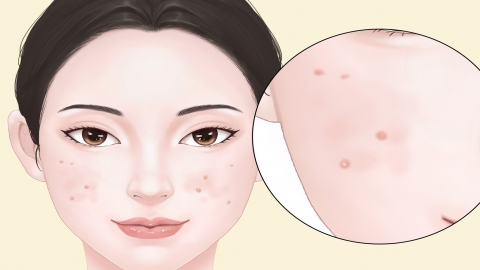How to Remove Acne Scars from the Face
Under normal circumstances, facial acne scars (pitted scars) may be caused by genetic factors, abnormal hormone levels, natural aging, the skin's self-repair capacity after injury, eczema, and other reasons. It is recommended to seek timely medical advice, identify the cause, and proceed with recovery through general treatment and medication under the guidance of a professional physician. A detailed analysis is as follows:

1. Genetic Factors
A genetic predisposition toward scar formation may exist. When the skin is injured, excessive proliferation of scar tissue during the healing process can lead to acne scars (pitted scars). Prompt medical consultation is advised, and under a physician's guidance, dermal fillers can be used to fill in the scars.
2. Hormonal Imbalance
Abnormal hormone levels, particularly elevated androgen levels, can stimulate increased sebum production by sebaceous glands, leading to clogged hair follicles and a higher incidence of acne. During acne healing, damage to deeper layers of the skin can result in pitted scars. This may be accompanied by symptoms such as menstrual irregularities and hirsutism (excessive hair growth). It is recommended to follow medical advice in using medications like spironolactone tablets, methimazole tablets, potassium iodide tablets, and others to regulate hormone levels, control acne, and prevent scar formation.
3. Natural Aging
With age, the skin's collagen and elastic fibers gradually decrease, causing loss of elasticity and firmness, making it more prone to develop acne scars. It is recommended to use physical therapies such as microneedling, photorejuvenation, and radiofrequency treatments. Additionally, using skincare products containing ingredients like vitamin C and hyaluronic acid can help promote collagen production and improve skin elasticity and firmness.
4. Skin Self-Repair Capacity After Injury
Following skin injuries, such as improper squeezing of pimples, the skin's self-repair process may lead to excessive scarring, resulting in pitted scars. It is recommended to use skincare products containing vitamins, which can help enhance the skin's self-repair capabilities.
5. Eczema
If facial skin remains in a moist, poorly ventilated environment for a prolonged period, eczema may develop, which can subsequently lead to acne-like scars on the face. This may also be accompanied by symptoms such as itching and blisters. Under a physician's guidance, medications such as hydrocortisone cream, Wet Toxin Clearing Capsules (Shidu Qing), and calamine lotion can be used for treatment.
When treating facial acne scars, individuals should choose appropriate treatment methods based on their specific condition. At the same time, maintaining good lifestyle habits and a positive mindset is important.






